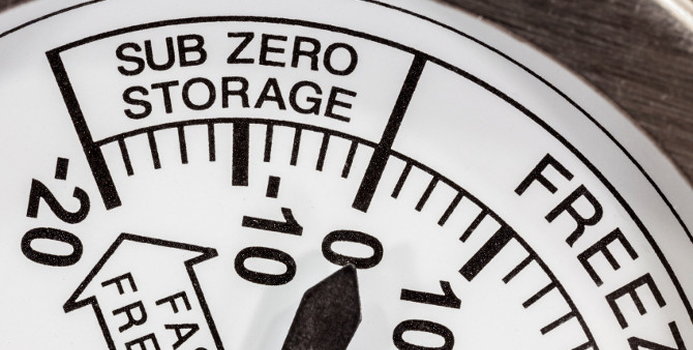The freezer is a handy addition to any cook's kitchen. Whether it's meals for the week or leftovers from the night before, the freezer lends an easy storage solution for saving food for longer periods of time. However, while freezing foods makes food safety less of a concern, food quality and the nutritional value of frozen foods still remain a priority concern, despite the chilly temperatures.
Food Safety
Food that is stored consistently at 0 °F will always be safe. Freezing food slows down the movement of molecules, forcing the microbes to enter a dormant stage. Bacteria, yeasts and molds are inactivated when frozen, thus preserving the food and preventing the growth of the microorganisms that can cause both food spoilage and foodborne illness. Once thawed, however, these microbes can again become active. And under the right conditions, they can multiply to levels that can lead to foodborne illness.
Food Quality
The overall quality of food can be impacted by the method and time of freezing. For fruits and vegetables, water makes up over 90 percent of most varieties. When this water freezes, it expands and forms ice crystals that can cause cell walls within the fruits and vegetables to rupture, leaving a much softer product.
Moisture loss, or ice crystals that begin to evaporate from the surface of a product, can result in freezer burn: a grainy, white or gray spot where the tissues of the product have become dry and tough. This freeze-dried area is likely to have off flavors and texture when thawed. Freshness and quality at the time of freezing affect the condition of frozen foods. So, freeze items you won't use sooner rather than later, and store them at 0° F or below in order to retain desirable color, flavor, texture and vitamin content.
Nutritional Value
Freezing, if done properly, is one of the best methods for food preservation that may actually preserve a greater quantity of nutrients. With a few exceptions, freezing does not cause a loss of nutritional value in foods. Some vegetables require blanching before being frozen. Blanching refers to cooking vegetables briefly in boiling water prior to freezing. This process is necessary to stop enzyme production in some vegetables to retain quality and freshness. The exposure to heat and water can cause certain vitamins to leach out of the vegetables, however, the subsequent flash freezing locks in the remaining nutrients, with little loss following during storage. In order to maintain top nutritional quality in frozen foods, it is essential to follow appropriate preparation and storage guidelines and to use it within suggested storage times.
Freezing for Maximal Freshness
In order to prolong the quality of your frozen foods, proper storage containers and timeframes must be established. Freezing time frames for some common food products include:
- Uncooked meats up to 12 months.
- Bacon and sausage up to 2 months.
- Shellfish 3 to 6 months.
- Casseroles, cooked meats, gravies, soups and stews up to 3 months.
- Egg whites and egg substitutes up to 12 months.
- Entrees and dinners up to 4 months.
- Breads up to 3 months.
- Butter 6 to 9 months.
- Cookies or cookie dough up to 2 months.
Although plastic bags and freezing paper are disposable, they may not always protect your food from freezer burn and changes in texture and color. Opt for rigid containers that are easily stackable. Following some of these basic guidelines will help to ensure that your frozen products come out as good as fresh each and every time.

Sarah Dreifke is a freelance writer based in DeKalb, IL with a passion for nutrition education and the prevention of chronic disease. She holds a Bachelor of Science in both Dietetics and Life Sciences Communication from the University of Wisconsin-Madison. Currently, she is working towards a combined Master's Degree in Nutrition and Dietetics as well as a dietetic internship at Northern Illinois University.



